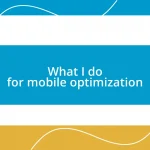Key takeaways:
- Authenticity and alignment with affiliate programs are crucial for building trust and effectively engaging your audience.
- Successful partnerships thrive on open communication, collaboration, and celebrating mutual successes.
- Continuous learning and adaptability are essential to navigate challenges and evolve in the ever-changing affiliate marketing landscape.
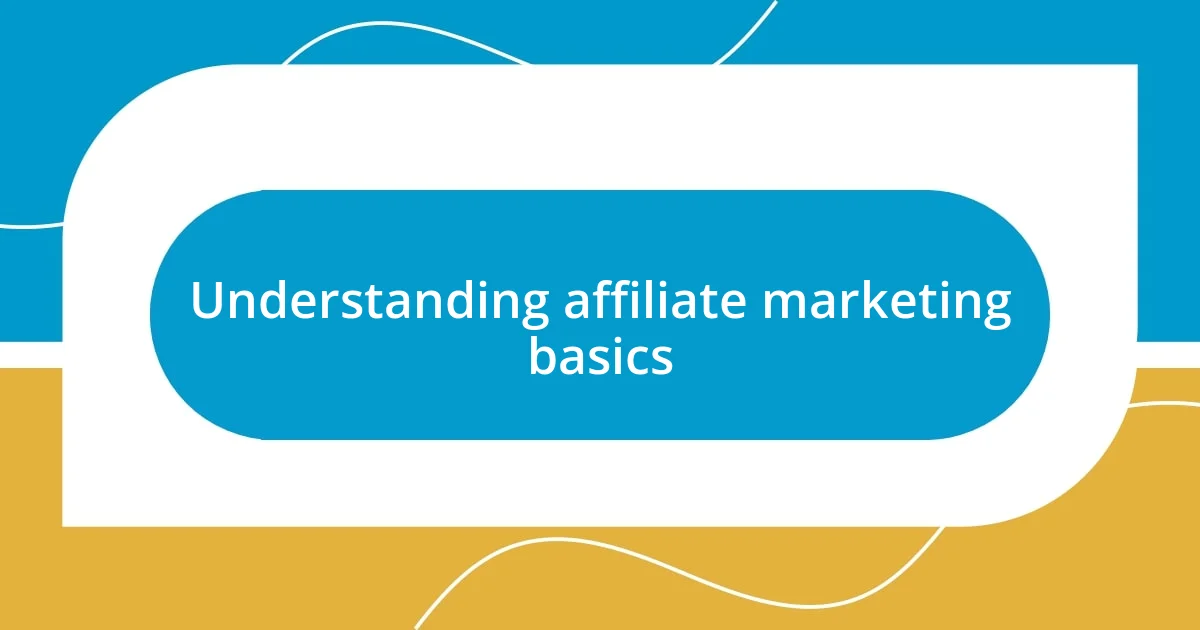
Understanding affiliate marketing basics
When I first stumbled upon affiliate marketing, I thought it was just about sharing links and making money while I slept. Little did I realize that it’s much more nuanced. Each click on a link can lead to a deep understanding of your audience’s needs and preferences; have you ever thought about how that connection might change the way you approach your content?
At its core, affiliate marketing connects creators like me with products or services I genuinely believe in. I remember the excitement when I made my first commission—it was as if my recommendations truly mattered. It’s all about trust; an emotional connection with your audience can make or break your success in this space. How could anyone not feel a rush when their insight translates into actual revenue?
Choosing the right affiliate programs is crucial, too. I learned this the hard way by promoting a product that didn’t resonate with my audience. The experience taught me that aligning with brands that reflect my values not only boosts credibility but also fosters a stronger bond with my readers. Isn’t it incredible how authentic partnerships can transform your approach to affiliate marketing?
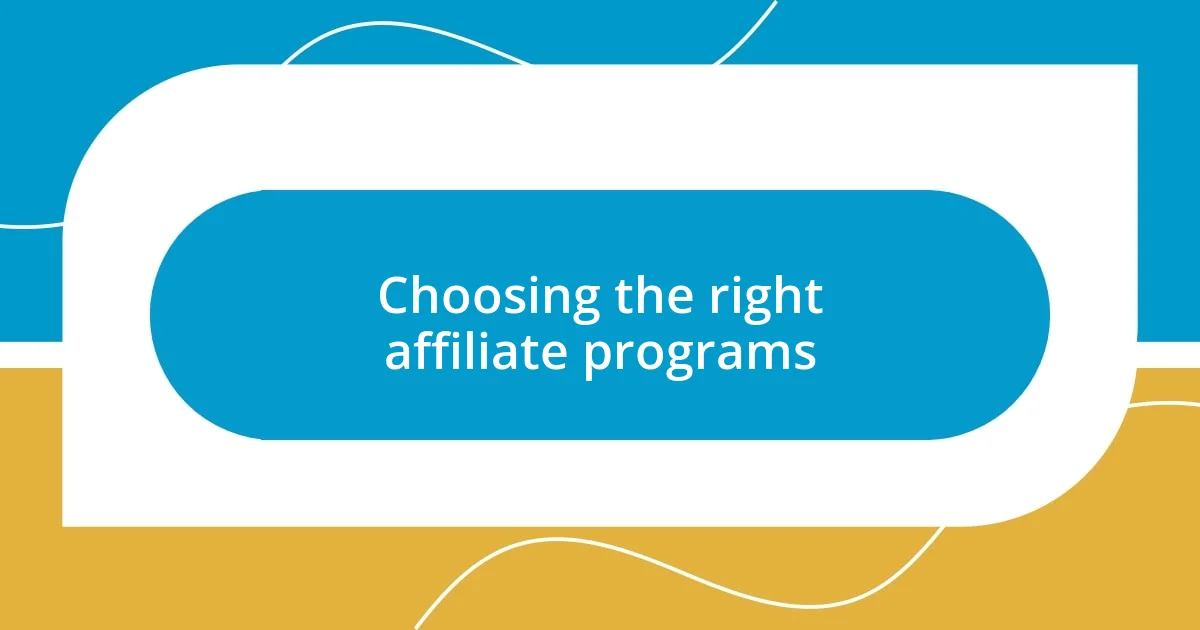
Choosing the right affiliate programs
Choosing the right affiliate programs is much like choosing the right partners in life; alignment is everything. I once joined an affiliate program just because it was popular, but it quickly became clear that my audience had no interest in the product. It felt disheartening to invest time creating content that didn’t resonate, proving that not every shiny offer is worth chasing. Have you ever noticed how authenticity shines through when you endorse things you truly care about?
I’ve discovered that evaluating affiliate programs should start with a careful consideration of your niche. For instance, when I aligned myself with a brand that offered eco-friendly products, I felt a genuine sense of fulfillment. The response was overwhelmingly positive, and it reinforced my belief that when you speak from the heart, your audience can sense it. How often do you think about the impact of your values on your affiliate choices?
Additionally, I’ve learned that transparency and support from affiliate programs matter a great deal. The best programs provide you with tools, guidance, and open communication. I remember feeling completely lost with my first affiliate partnership; clear instructions would have made all the difference. When you choose a program that prioritizes its affiliates, you not only enhance your chances of success but also build a more enriching experience for yourself and your audience.
| Criteria | Program A | Program B |
|---|---|---|
| Niche Relevance | High | Medium |
| Commission Rate | 15% | 10% |
| Support & Resources | Excellent | Average |
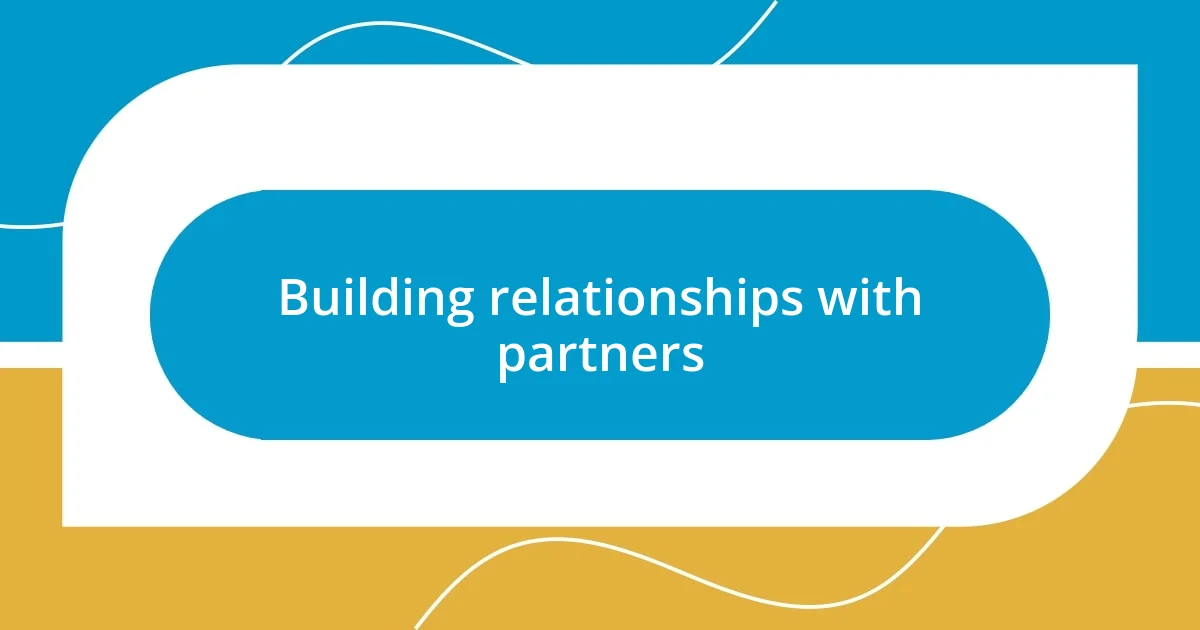
Building relationships with partners
Building solid relationships with my affiliate marketing partners has been essential for my growth. I remember my first joint campaign; we spent hours brainstorming and refining our ideas. That experience taught me that collaboration thrives on open communication and shared goals. When each party values the other’s insights, the partnership transforms into a creative powerhouse.
To foster these connections, I always keep a few key points in mind:
- Be Genuine: Authenticity goes a long way. Partners appreciate honesty and transparency about expectations.
- Frequent Communication: Regular check-ins help maintain a strong bond and ensure everyone is on the same page.
- Celebrate Wins Together: Acknowledging each other’s successes fosters a spirit of camaraderie. I learned this after a successful launch when we shared our wins and reflected on what worked well.
- Provide Feedback: Constructive feedback strengthens partnerships and drives growth. It’s only through sharing insights that we can enhance our strategies.
Each of these practices has made me realize that successful partnerships are built on trust and mutual support. Actively engaging with partners, rather than seeing them as just another link in the chain, enriches the experience and leads to amazing opportunities.
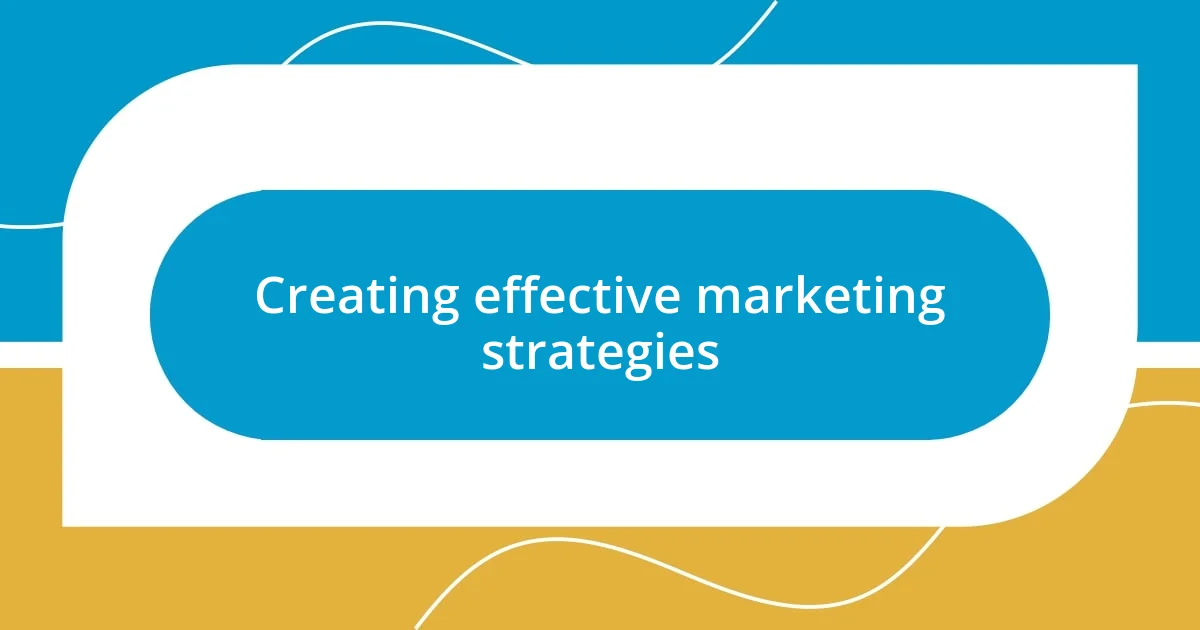
Creating effective marketing strategies
When creating effective marketing strategies, I’ve found that a clear understanding of your audience’s needs is fundamental. During one campaign, I noticed a significant drop in engagement. After analyzing the data, I realized I had strayed too far from topics that truly interested my followers. This experience taught me the importance of staying connected with your audience and adjusting your strategies based on their preferences.
A/B testing has been a game-changer for me in refining my marketing approach. I remember running two different email promotions for the same product. One focused on highlighting features, while the other told a compelling story about how the product could change lives. The latter drove engagement through the roof! Isn’t it fascinating how emotional storytelling can shift consumer behavior? It really reinforced my belief that understanding the emotional triggers of your audience can lead to remarkable results.
Additionally, I prioritize setting clear goals and metrics for every campaign I launch. Early on, I dived head-first into a project without clear objectives, which ended up being a bit chaotic. It left me questioning my success metrics. Now, I ensure I have specific, measurable goals laid out from the start. Have you ever felt lost trying to figure out whether a campaign was truly successful? Developing clear benchmarks not only helps track progress but also informs adjustments along the way, making the entire process more efficient and effective.
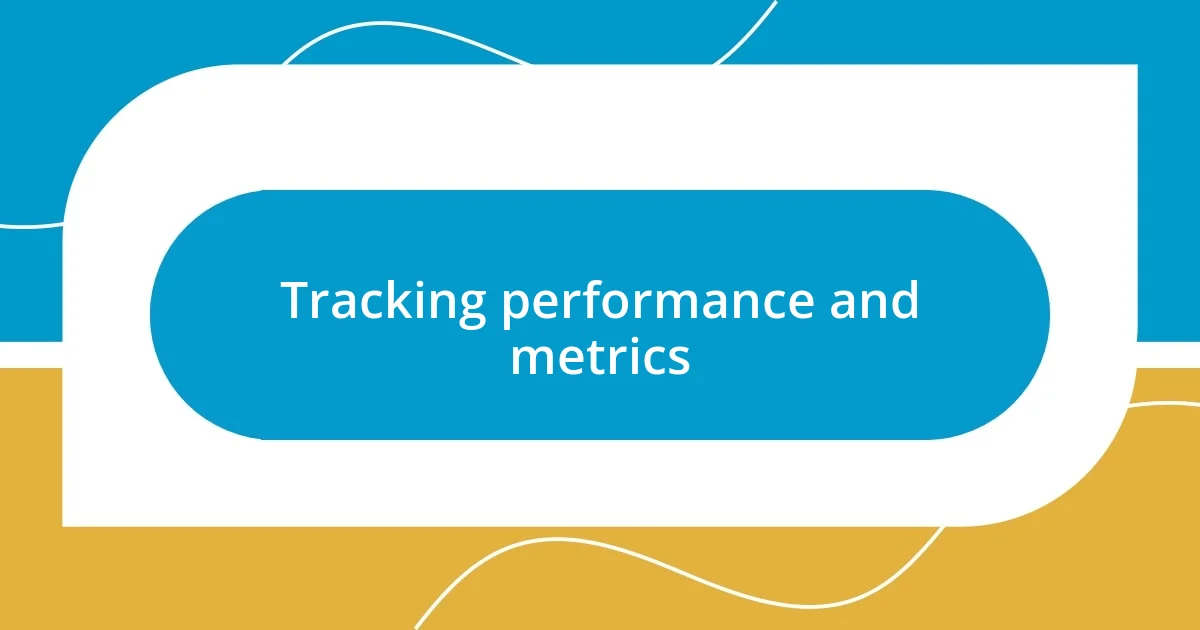
Tracking performance and metrics
Tracking performance and metrics can often feel like peering into a complex maze of numbers. In my early days, I relied solely on basic vanity metrics like clicks and impressions. I quickly discovered that these numbers weren’t telling the whole story. For instance, after analyzing conversions, I realized that not all traffic is valuable—some campaigns drove plenty of clicks but failed to translate into sales. Have you ever had similar revelations? It’s eye-opening to see that not all activity correlates to success.
The tools I’ve used to measure performance have been game-changers in my affiliate marketing journey. I remember implementing Google Analytics for the first time; it was like switching on a light in a dim room. Suddenly, I could see which affiliate links generated the most revenue and which strategies needed reevaluation. I began to appreciate the impact of tracking user behavior, which helped tailor my campaigns more effectively. This shift in focus has allowed me to optimize my efforts and truly understand my audience.
Looking at the bigger picture, I believe that performance metrics should guide us, not overwhelm us. I’ve learned to focus on a few essential KPIs that align with my goals, rather than drowning in data. For example, tracking the return on investment (ROI) for each campaign has been incredibly insightful. It allows me to assess not just how much money I’m spending, but how effectively I’m using resources to generate profits. Isn’t it empowering to see your efforts translate directly into financial success? This clarity has transformed my approach, making every decision more informed and strategic.
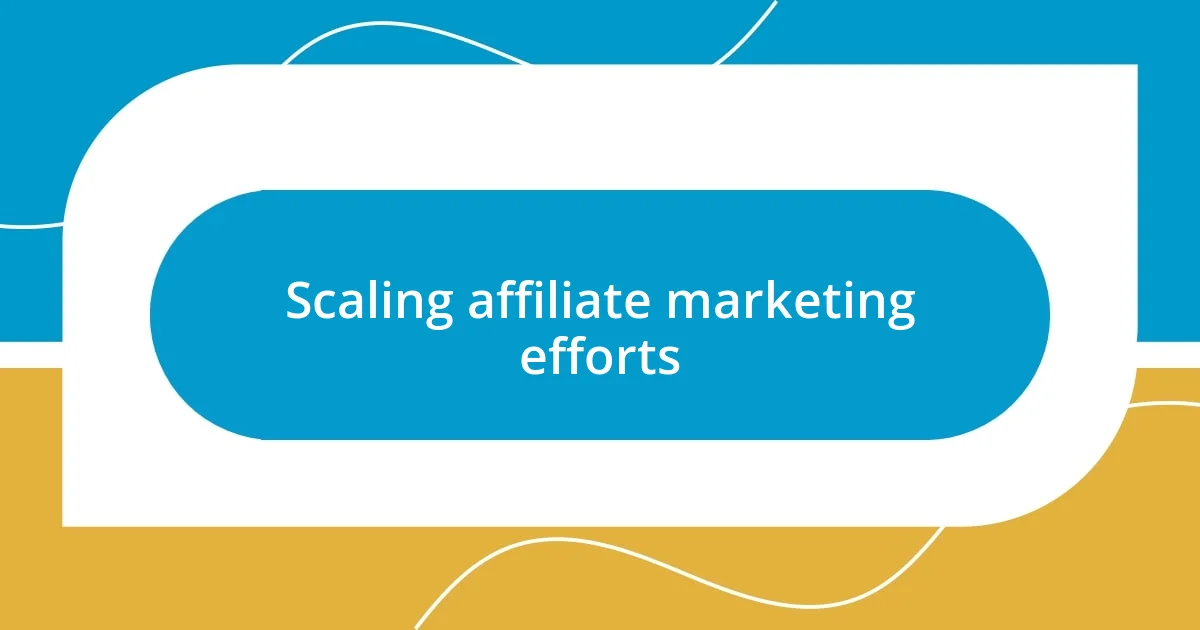
Scaling affiliate marketing efforts
Scaling your affiliate marketing efforts requires a blend of strategic thinking and adaptability. One of my most pivotal moments was when I identified opportunities for multi-channel promotion. I remember a campaign where I collaborated with influencers across several platforms—like Instagram and YouTube. This not only broadened my reach but also created a sense of community around the product. Have you ever thought about diversifying your promotional strategies? Embracing different channels can significantly enhance audience engagement.
Investing in automation tools has also been a game changer. Early on, I found myself overwhelmed by managing multiple campaigns manually. It felt like a never-ending cycle of reminders and checklists. Once I integrated an email marketing tool that allowed for automated follow-ups, my productivity skyrocketed! I was finally able to focus on creative aspects rather than being bogged down by daily tasks. Could you imagine what a relief it would be to streamline your work and focus more on strategy?
Lastly, I’ve learned that collaboration with fellow marketers can unlock scaling potential. One time, I partnered with a peer to co-create content, which leveraged both our audiences. The synergy we built not only expanded our reach but also enriched the content we delivered. Networking in this way was eye-opening. Have you ever considered how collaboration could amplify your efforts? It’s these connections that often lead to enhanced opportunities and innovation in our marketing strategies.
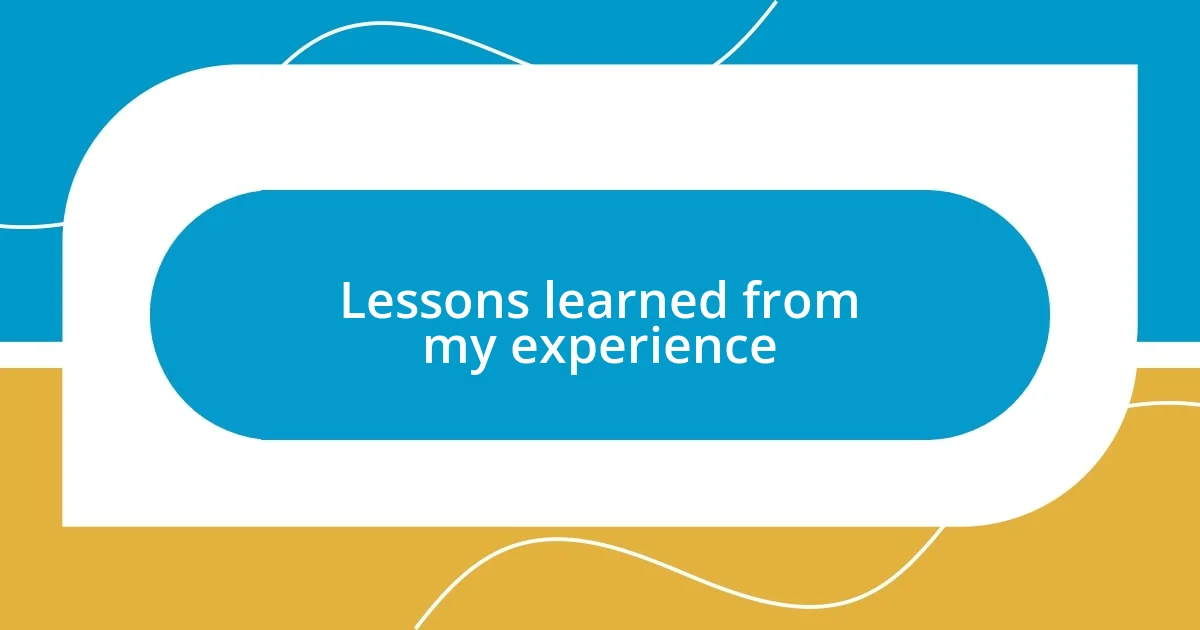
Lessons learned from my experience
One of the biggest lessons I learned from my experience in affiliate marketing partnerships is the importance of building genuine relationships. In the beginning, I approached collaborations as mere transactions, driven solely by the potential for profit. However, I quickly realized that when I invested time in nurturing these relationships, the results were far more rewarding. Have you ever felt that spark when a partnership becomes mutually beneficial? It’s that connection that leads to shared audiences and deeper trust, ultimately driving more conversions.
Another crucial takeaway was the significance of adaptability. I can’t count how many times I faced unexpected challenges with campaigns—like a sudden change in platform algorithms or shifting consumer trends. Each setback felt daunting at first, but I learned to pivot and adjust my strategies rather than clinging to what was comfortable. I vividly remember a campaign that flopped due to a misaligned target audience; changing my approach mid-course helped me not only salvage it but also replicate that success later. Doesn’t it feel empowering to turn challenges into stepping stones for growth?
Lastly, I came to understand the need for continuous learning. The affiliate marketing space evolves rapidly, and I’ve had to embrace the idea that I can always improve. I recall attending a workshop that completely changed my perspective on content creation. It opened my eyes to innovative strategies I hadn’t previously considered. The excitement of discovering new tactics is thrilling, and it reminds me that growth is a journey. Don’t you think that staying curious can be one of the most valuable traits in this industry?


